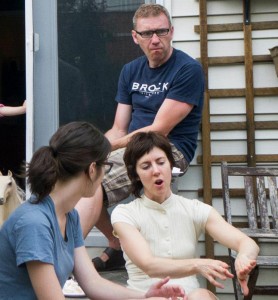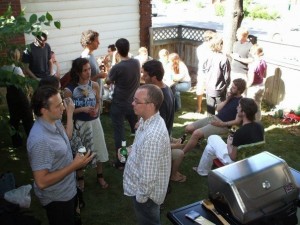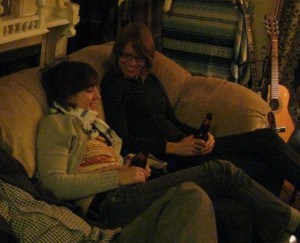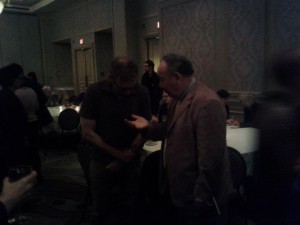 There are different forms that talking can take. We reveal that we are familiar with this when we rely on the common distinction between “small talk” and a “deep” conversation. Sometimes, someone says “we need to have a talk,” and you know it’s serious, and other times we mockingly refer to ourselves or others as just going “blah, blah, blah.”
There are different forms that talking can take. We reveal that we are familiar with this when we rely on the common distinction between “small talk” and a “deep” conversation. Sometimes, someone says “we need to have a talk,” and you know it’s serious, and other times we mockingly refer to ourselves or others as just going “blah, blah, blah.”
This distinction between small-talk and deep conversation is important, and it speaks to a real difference that we experience in different situations, but it barely scratches the surface of the varieties of discourse in which we engage.
The first time I recall really being prompted to think about this exact topic was a night when I heard a singer performing John Prine’s tune “Angel from Montgomery.” The narrator of that song asks, “How the hell can a person go to work in the morning, come home in the evening, and have nothing to say?” A friend with whom I was sitting that night thought this line reflected correctly the problematic attitude of a silent spouse who can spend a whole day engaged with worldly affairs and yet have nothing to share with his or her partner. There’s surely something right about that interpretation. We do go through our days wrapped up in myriad affairs that occupy our attention, our problem-solving skills, our emotions and more, and it seems that that should supply material to share with someone else, someone close. And it does seem true that people get into bad relationships with their partners, developing habits of withdrawal and silence rather than sharing. There is something right about being frustrated with one’s partner who goes to work in the morning, comes home in the evening, and has nothing to say.
But, I thought, there is another answer to the question asked in that song. How can such a thing happen? Well, it can happen because one’s work or one’s life is so stultifying that one is not stimulated but suppressed. Or, again, one’s work or one’s life can be so challenging that one seeks rest. Perhaps, after a difficult day, we want to be petted and amused rather than being called upon to be lively and engaging. The song doesn’t really seem to be asking a question, but rather to be making an assertion that such behaviour is wrong, but in truth I think the question is real, and it is worth thinking seriously about how such a situation can come about.
These initial musings about the situation presented in John Prine’s tune, (and, incidentally, it is worth noting that this is one of the great things about music and the arts in general, namely, that they invite us into a world that allows us room for imaginative musing), led me to further reflections about what we talk with others about and what it takes for us to have those conversations.
 The other night, I went to a party at the home of friends whom I like very much. Further, the other guests at the party were also people I like very much and whose company I welcome. And, yet further and more importantly still, I went in the company of someone very dear to me. I went to the party with some trepidation, though, because, though I liked the idea of seeing people I like, I knew that I had nothing to say.
The other night, I went to a party at the home of friends whom I like very much. Further, the other guests at the party were also people I like very much and whose company I welcome. And, yet further and more importantly still, I went in the company of someone very dear to me. I went to the party with some trepidation, though, because, though I liked the idea of seeing people I like, I knew that I had nothing to say.
My having nothing to say didn’t mean that I had nothing on my mind. I always have many things on my mind. Not all thoughts, though, translate easily into conversation.
Many of the partygoers that night were professional musicians, and two of them were talking about the concert one had attended the night before. They both knew various people associated with the concert—sound technicians, sidemen, etc.—and the concert-going experience provided material for lots of conversation. I hadn’t gone to a concert, but I had done various other things over the preceding days—things I found interesting. Those activities, though, mostly involved other people from the world of professional philosophy, people, that is, who were not known to the other partygoers. I had lots of thoughts about the people I had been involved with and the activities I had been engaged in, but the ways in which these thoughts were interesting to me would not have been interesting or even meaningful to any of the people at the party. I couldn’t really talk about these things, because, regarding these things, the people at the party and I did not belong to the same community. (This suggests the tremendous difficulty that must be faced by immigrants who have left behind their friends, family members, cities, religions, cultures. How narrow must be the opportunities for sharing, that most basic human experience, upon their arrival in their new land.)
On another recent occasion, another friend was mildly grumbling about the way various of my musician-friends talk exclusively about music when we go out, leaving other friends who are not musicians out of the conversation. She surely is right to be critical of specific individuals in particular situations who carry out their conversations in a socially inept way; in general, though, it seems to me that it is almost always the case that our conversations revolve around our shared interests, and so it should be the case that musicians talk about music. It is around our interests that we have the greatest depth of involvement, which means it is around our interests that we are interesting, and it is really only going to be in social environments in which people are well-attuned to our specialized interests that we will really be able to share our most compelling thoughts and feelings. In the words of my friend Morgan Childs: “We’re discussing important things here. Drummer things. You wouldn’t understand.” It is these most intimate and deep engagements that provide the most interesting and engaging materials for sharing, but such sharing requires others who have compatible, and compatibly deep involvements with the same issues.
 Some of our intimate and deep engagements, too, are essentially private: our intimate interpersonal and emotional affairs can very much be what is on our minds, and we can have very deep and developed thoughts about these matters, but such thoughts are not for public consumption. An emotionally trying day or an emotionally fulfilling day can dominate our experience, and “inside” we can be effectively “bubbling over” with things we’d like to say, but this may very well go along with a generally silent demeanour in a social setting precisely because those thoughts are only to be shared with our intimate companions.
Some of our intimate and deep engagements, too, are essentially private: our intimate interpersonal and emotional affairs can very much be what is on our minds, and we can have very deep and developed thoughts about these matters, but such thoughts are not for public consumption. An emotionally trying day or an emotionally fulfilling day can dominate our experience, and “inside” we can be effectively “bubbling over” with things we’d like to say, but this may very well go along with a generally silent demeanour in a social setting precisely because those thoughts are only to be shared with our intimate companions.
And, indeed, if I do want to share my intimate feelings with my partner, that will require that he or she bring an appropriately receptive attitude: I will not want to share my most sensitive feelings when my partner is angry with me or distracted or preoccupied with something else. I may have much to say, but in certain situations it may be very hard to say those things.
All of this led me to reflect on how much conversational sharing depends on a matching up of speaker and listener. In order to share freely our thoughts and feelings, we need others who belong to the same general social world as we do, and the more developed our lives are, the more specialized that social world needs to be. We need others who have a cultivated relationship to the same issues with which we have developed a cultivated relationship. And especially we need others who provide an appropriately supportive emotional space for us to feel open to sharing those things we truly care about.
 So, talking can take many different forms. There are very specialized situations when we have “deep” conversations, and there are throw-away situations when we engage in trivial “small talk.” Most of our conversations, though, correspond to neither of those two categories. Most of our conversations are rather specialized explorations of matters of mutual interest. Such sharing goes hand in hand with specialized relationships: we share freely with those with whom we have developed a bond, which involves both a developed, shared interest and a comparably developed emotional intimacy. The lack of either an appropriately developed shared involvement or an appropriately developed level of intimacy makes real conversation impossible. In short, the extent and the depth of our conversational life varies pretty directly with the extent and the depth of our friendships, and the forms of our conversation are as varied as the forms of our companionships.
So, talking can take many different forms. There are very specialized situations when we have “deep” conversations, and there are throw-away situations when we engage in trivial “small talk.” Most of our conversations, though, correspond to neither of those two categories. Most of our conversations are rather specialized explorations of matters of mutual interest. Such sharing goes hand in hand with specialized relationships: we share freely with those with whom we have developed a bond, which involves both a developed, shared interest and a comparably developed emotional intimacy. The lack of either an appropriately developed shared involvement or an appropriately developed level of intimacy makes real conversation impossible. In short, the extent and the depth of our conversational life varies pretty directly with the extent and the depth of our friendships, and the forms of our conversation are as varied as the forms of our companionships.
Talking is sharing our experience, and that is, I think, what we want to do most. But such talking is not something we can do on our own: it requires an appropriately prepared environment that only another person can offer. That’s what friends are for.


 Participants in these
seminars consistently have the experience of growth in their conversation and
conceptual abilities, and typically leave with a transformed sense of the nature
and possibilities of philosophy.
Participants in these
seminars consistently have the experience of growth in their conversation and
conceptual abilities, and typically leave with a transformed sense of the nature
and possibilities of philosophy.




